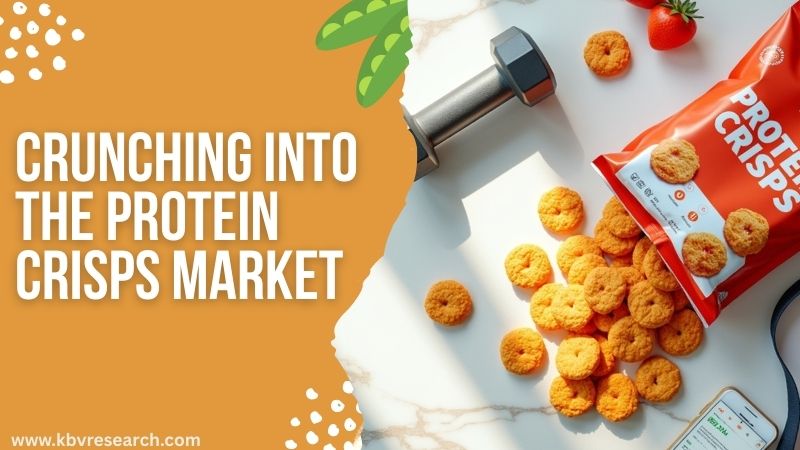
In recent years, protein crisps have emerged as a popular snack choice for health-conscious consumers, fitness enthusiasts, and anyone looking for a guilt-free crunch.
With gym culture, keto living, and high-protein diets trending like never before, it’s no surprise that the Global Protein Crisps Market size is expected to reach $2.64 billion by 2031, rising at a market growth of 8.1% CAGR during the forecast period.
But what exactly is driving this crunchy craze?
Let’s bite into the key trends, major players, and what's shaping the future of this snackable innovation.
Imagine the airy crunch of a chip—but with the nutritional punch of a protein shake.That’s what Protein Crisps deliver.
They’re made using whey, soy, pea, or other plant-based proteins, puffed or baked into a satisfying, crunchy snack. Popular brands like barebells protein bar creamy crisp and crisp protein bar are gaining momentum across fitness shelves and office pantries alike.
These crisps have become a guilt-free option for consumers who crave a quick bite—without blowing up their carb count. With many versions offering 10-20 grams of protein per serving, they’re not just trendy, they’re functional.
But here are the biggest catalysts lighting the fuse.
Today’s consumers are snacking more—but mindfully.
According to Mintel, over of Americans snack to support their health goals, not just curb hunger. Protein crisps fit neatly into this lifestyle. They’re portable, satisfying, and align with diets like keto, paleo, and high-protein regimens.
COVID-19 shifted global focus toward preventive health and immunity.
Consumers became label-readers overnight. As a result, clean labels, natural ingredients, and nutrient-rich snacks saw a surge. Protein crisps—rich in protein, low in sugar, and often gluten-free—ride that wave perfectly.
Though whey still dominates, plant-based protein crisps are gaining traction.
Soy, lentils, chickpeas, and pea proteins are increasingly used to appeal to vegan and flexitarian markets.This shift highlites the trending events and change in consumer behavior across demographics.
The modern-day obsession with macronutrients, especially protein, has shifted consumers away from carb-heavy snacks.
With more people going vegan or flexitarian, soy protein-based crisps are gaining attention.
Consumers want protein without the blender. Crisps offer a mess-free option in a fast-paced lifestyle.
However, it’s not all smooth crunching:
Protein crisps are often priced higher than traditional snacks, which may deter budget-conscious buyers.
Health-focused consumers are increasingly scrutinizing labels. Artificial ingredients, preservatives, or added sugars can be deal-breakers.
Here are the major companies reshaping the global protein crisps market:
Known for innovation, General Mills has expanded its portfolio to include nutrient-rich, crunchy snacks aimed at Gen Z and millennials.
They’ve gone beyond cereal with plant-based and soy protein crisp options, catering to the vegan and flexitarian crowd.
With brands like Off The Eaten Path and Bare Snacks, PepsiCo is investing heavily in protein-forward snacking solutions.
Nestlé is integrating protein crisps into its functional food lines, especially in emerging markets where nutritional gaps are high.
Influencers, fitness coaches, and dieticians are constantly posting “What I Eat in a Day” videos.
Protein crisps often make an appearance—boosting awareness and driving impulse buys.
The rise of online shopping gave smaller protein crisp brands a level playing field.
Now, niche products can gain cult followings on Instagram or TikTok and sell directly through their own websites.
Millennials and Gen Z demand full transparency.
From macro-nutrient ratios to allergen disclosures—everything is under the microscope.
That’s why brands with clean labels, simple ingredients, and functional benefits are winning market share.
North America holds of the market share, with the U.S. leading the charge.Asia-Pacific is the fastest-growing region, especially with rising awareness in India, China, and Japan.
Private-label and emerging brands are gaining traction through social media virality and influencer partnerships.In short, protein crisps are no longer niche.They're a mainstream megatrend that blends health, tech, and taste.
The Protein Crisps market isn’t just a passing trend—it’s a seismic shift in how we view snacks.It’s where indulgence meets intention.From barebells protein bar creamy crisp to the latest crisp protein bar brand, innovation is key—and the big players are taking notes.
So whether you're an investor, a wellness entrepreneur, or just someone trying to eat clean without feeling deprived,keep your eyes on the crunch.Because this snack isn’t slowing down anytime soon.